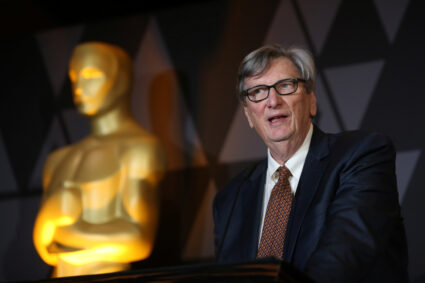
Valentino Garavani, the iconic Italian designer known for his glamorous gowns and signature “Valentino red,” has died at 93.

LOS ANGELES (AP) — John Bailey, a cinematographer who led the Academy of Motion Picture Arts and Sciences during the initial #MeToo reckoning, died Friday at 81.
Bailey died "peacefully in his sleep" in Los Angeles, his wife, Carol Littleton, said in a statement distributed by the film academy.
Bailey — who worked on films ranging from "Ordinary People" to "Groundhog Day" to "How to Lose a Guy in 10 Days" — was the first cinematographer to preside over the Academy, serving two terms that spanned 2017-2019.
Those were tumultuous years for the film industry. When Bailey took over, the Oscars alone had been grappling with falling ratings, controversies over the homogeneity of its choices (#OscarsSoWhite) and the infamous envelope flub in 2017 that marred the best picture win for "Moonlight." Scarcely two months into his presidency, The New York Times and The New Yorker released bombshell reports about sexual assault allegations against movie mogul Harvey Weinstein that ignited an industry-wide reckoning about power structures and abuses.
READ MORE: #MeToo leaders take stock of the movement 5 years later
The Academy's Board of Governors voted to expel Weinstein shortly after the reports. Afterward, with questions arising about other members who remained in good standing despite being accused, Bailey said in a memo to members that the organization "cannot, and will not, be an inquisitorial court, but we can be a part of a larger initiative to define standards of behavior and to support the vulnerable women and men who may be at personal and career risk because of violations of ethical standards by their peers."
The Academy subsequently adopted a code of conduct stipulating it was no place for "people who abuse their status, power or influence in a manner that violates standards of decency," and made it easier to suspend or expel members.
"I may be a 75-year-old white male, but I'm every bit as gratified as the youngest of you here that the fossilized bedrock of many of Hollywood's worst abuses are being jackhammered into oblivion," Bailey said at the 2018 Oscars luncheon.
Soon after, Bailey himself was accused of attempting to touch a woman inappropriately on a movie set a decade prior. Bailey denied the allegation and an Academy investigation determined no further action was required in March 2018. He was reelected to a second term later that year.
Bailey's tenure also saw attempts to change the Academy Awards ceremony that grew contentious. In 2018, the Academy announced the Oscars would add a popular film award and shorten the telecast by bumping the presentation of certain categories to commercial breaks.
"We have heard from many of you about improvements needed to keep the Oscars and our Academy relevant in a changing world," Bailey and Academy CEO Dawn Hudson wrote in an email to members.
The moves sparked immediate backlash, including fears that the new category would relegate hits like that year's "Black Panther" out of contention for the best film award. A month later, the "outstanding achievement in popular film" award had been tabled.
Bailey told The Associated Press at the time that he had been surprised by the intense reaction.
"The idea of this award was not about trying to make sure that certain kinds of big mass market pictures get recognized. To my mind, it's more about the kind of pictures that are so difficult to get made," he said. He championed "middle pictures," citing his own films as examples of movies with larger budgets that don't tend to get laurels.
(The decision to cut categories from the telecast was also unpopular, but stuck — temporarily. All categories have since been restored to the show.)
Bailey is survived by Littleton, a former Academy governor and film editor who was nominated for an Oscar for "E.T. The Extra-Terrestrial." She was announced as the recipient of an honorary Oscar this year, but the Governors Awards ceremony was delayed because of the Hollywood strikes.
The Oscars are ever-evolving, with more changes since Bailey's time at the top. In his view, the Oscars could not be a static entity. Instead, he told the AP in 2018, the statuette "is a symbol of excellence in an ever-changing industry. And what we're trying to do is keep up with those changes and honor those changes. It's not like it's frozen in time, these awards."
"For an institution that people keep saying is irrelevant and is out of touch with everything to do with the industry, and there are people who say that, they seem to be very eager to kind of jump into the fray, voice their opinions and create discussion," Bailey said. "If we're that irrelevant, why is everybody so concerned about it?"
Sustain our coverage of culture, arts and literature.